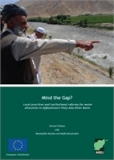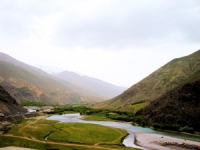Water sharing between Central Asian countries has been conflicting for quite a long time already.
Mind the Gap? Local practices and institutional reforms for water allocation in Afghanistan’s Panj-Amu River Basin
Since 2004, policymakers and international donor agencies have been trying to introduce “good” water governance concepts in the reform of Afghanistan’s water sector, including integrated water resource management, river basin management and participation in decentralised decision-making via Multi-Stakeholder Platforms. Starting in 2005, the Panj-Amu River Basin Program has been piloting the introduction of these imported concepts in north-eastern Afghanistan.
With this context in mind, this paper draws on research carried out in two areas of the Panj-Amu Basin—the Taloqan Sub-basin and Lower-Kunduz Sub-basin—during the dry year of 2011. In doing so, it attempts to provide a better understanding of how local institutions currently deal with water allocation at the sub-basin level in times of drought, and discuss further policy challenges and opportunities.





